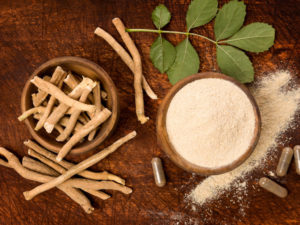An new trial in the Journal of Alternative and Complementary Medicine has shown benefits in thyroid hormone production for those taking Ashwagandha. The trial had participants with subclinical hypothyroidism.
Subclinical hypothyroidism is a condition where the body produces mildly elevated serum thyroid-stimulating hormone (TSH) levels. At the same time, levels of the major thyroid hormone thyroxine (T4) are still at normal levels. While the drug levothyroxine is often prescribed, researchers have questioned whether it is beneficial for all people with subclinical hypothyroidism.

Ashwagandha is a potent natural treatment for hypothyroidism.
Symptoms include depression, constipation, fatigue, goiter (swelling in the front of the neck due to an enlarged thyroid), weight gain, hair loss, intolerance to cold and memory problems with a “brain fog”. Ashwagandha is a plant whose root and berries are used to make medicines. While it has many uses, there is a lack of information proving whether or not its use in those areas are really true.
Some of these uses include:
- Arthritis
- Anxiety
- Bipolar disorder
- Trouble sleeping (insomnia)
- Tumors
- Tuberculosis
- Asthma
- Backache
- Fibromyalgia
- Menstrual problems
- Chronic liver disease
It can be used to reduce the side affects of medications for cancer and helps reduce blood fat and sugar levels. The trial selected 50 men and women at random with subclinical hypothyroidism. Each received 600 milligrams Ashwagandha root extract or a placebo for 8 weeks. At three points, serum thyroid hormone and TSH levels were measured.
These points were at the beginning of the trial, at 4 weeks, and at the end of the treatment period. Scientists found 41.5% average increase of serum thyroid hormone compared to levels measured at the beginning of the trial. In those who received a placebo, serum thyroid hormone was at lower levels. TSH levels were 19.6% higher among subjects who received herb, the placebo group remained the same at the end of the trial.
Researchers found the thyroid stimulating hormone levels, similar in both groups at the beginning of the study, declined by 17.4% after 8 weeks in those receiving the herb. These levels did not change significantly in the placebo group during the course of the study. Are you dealing with thyroid issues you’d like to address holistically? If so, you should schedule a consult with me. Let’s discuss your options together and come up with a solution that works.


